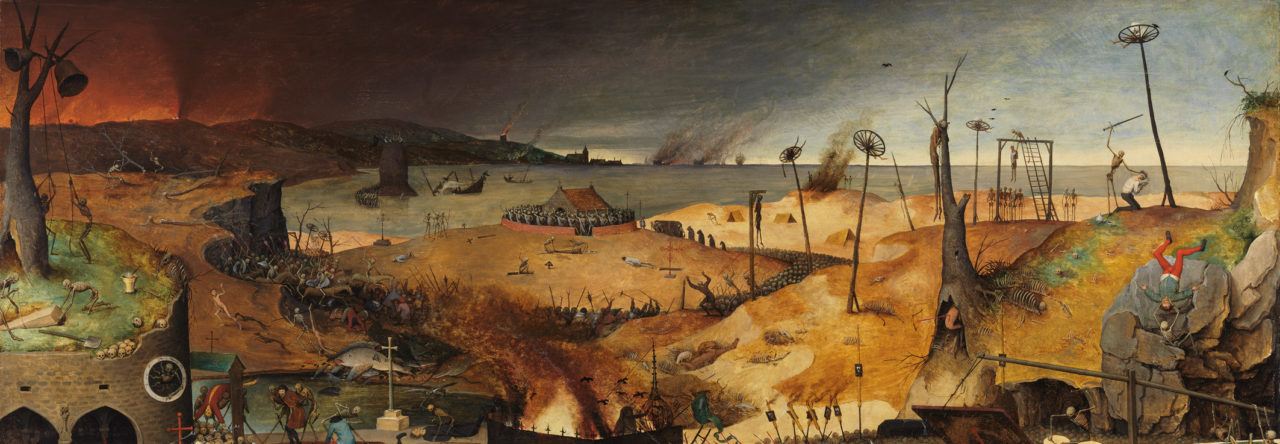Not long ago, I watched a production of Ionesco’s play, ‘The Bald Soprano’ on Youtube. This is a classic example of the ‘Theater of the Absurd’. Here are a few characteristic lines taken from the opening scene.
[Mr & Mrs Smith are discussing the death of Bobby Watson]:
MR. SMITH: He was the handsomest corpse in Great Britain. He didn’t look his age. Poor Bobby, he’d been dead for four years and he was still warm. A veritable living corpse. And how cheerful he was!
MRS. SMITH: Poor Bobby.
MR. SMITH: Which poor Bobby do you mean?
MRS. SMITH: It is his wife that I mean. She is called Bobby too, Bobby Watson. Since they both had the same name, you could never tell one from the other when you saw them together. It was only after his death that you could really tell which was which. And there are still people today who confuse her with the deceased and offer their condolences to him. Do you know her?
Now this is certainly quite funny – and it gets funnier as yet a few additional Bobby Watsons come into play as the scene continues. However, I would not trade the absurdity quotient in this scene, high as it is, for the even higher absurdity quotient regarding an experience that I had in Chinatown many years ago. It was in a restaurant called Hong Wah, one of many in Chinatown, specializing in characteristically greasy, inexpensive – but highly valued and delicious dishes. In fact this is the very restaurant I was seeking in the memorable 2:00 am Mott Street procession mentioned in a previous post (SEE ’Tales of Old Chinatown I’).
I was sitting at a table, enjoying a typically greasy but delicious Cantonese noodle dish when something caught my attention. Much to my astonishment, I observed what appeared to be an argument going on between one of the waiters and a diner. The diner appeared to be of college age and he was accompanied by a young woman. The argument soon became quite vociferous and rancorous. The issue in question appeared to be in regard to an order of duck lo mein. My attention was fraught indeed, not merely because of the extraordinary and unprecedented sight of witnessing an argument in a Chinatown restaurant, but because the argument seemed to be about an order of duck lo mein. This was a dish I myself had eaten on many occasions, and without any arguments I might add. After listening for a few moments, I concluded that here was a spectacle that would remain memorable for many years to come. The dialog proceeded roughly along the following lines:
Diner: ‘I’m sorry but I don’t believe that the ratio of duck to noodle content observable on this plate warrants the sort of price that you apparently expect me to pay.’
Waiter: ‘What you say? What you mean? What? What…?’
Diner: ‘After all, one observes the merest occasional and fleeting presence of shreds which I suppose may or may not have come from a duck.’
Waiter: ‘What? What? This duck lo mein, duck lo mein.’
Diner: ‘I simply refuse to accept this dish. Furthermore—‘
Waiter: ‘You not gonna pay? Not gonna pay for the duck lo mein? You not gonna pay?’
Diner: ‘No. I certainly will not.’
Whereupon the waiter, having meticulously informed his superior about the proceedings (I assume meticulously as the dialogue was expressed in a torrent of Chinese), then proceeded to take the extraordinary and, I imagine, quite historic step of locking the door of the restaurant. Presumably the diner was regarded as a ‘flight risk.’ One might question the nature of the risk as the dish in question came in at the cost of $1.25.
The restaurant was, as we would now say, ‘locked down.’ I don’t remember what we said back in the medieval days of the 1960s. Probably what we said then was: ‘Jesus, they just locked the f***ing restaurant.’ More was to come.
Naturally, when a crime is sufficiently heinous to induce the locking of a door in order to prevent the criminal from fleeing, the next appropriate step would be to call the police. A policeman arrived in due course. He appeared to have been sent by a central casting agency, perhaps of the 1930s or ’40s vintage. He was a burly, Irish looking individual. However, uncharacteristically, he was not filled with swagger and bravado. Just the reverse in fact. He looked quite unhappy as he walked into the restaurant, perhaps correctly sensing that nothing good was going to come out this; his unhappiness was to increase.
As my dinner was finished and happily, an armed policeman present, the door was unlocked and patrons were free to exit. As I payed the bill, I observed the following unforgettable tableau:
One waiter, apparently frothing at the mouth with rage (’… is a duck lo mein, a duck lo mein’); a patron, still carefully trying to parse out the merits of his case (‘clearly, whether or not you calculate the purported duck in ounces or grams, if you will – and I do mean ‘purported’ duck in it’s unacceptable ratio to noodle content… ‘); and one policeman, looking more and more unhappy, scratching his head in a classic Screwball Comedy mode.
I would have been willing to spend a lot more than $1.25 for the privilege of being part of this memorable dining experience.


























